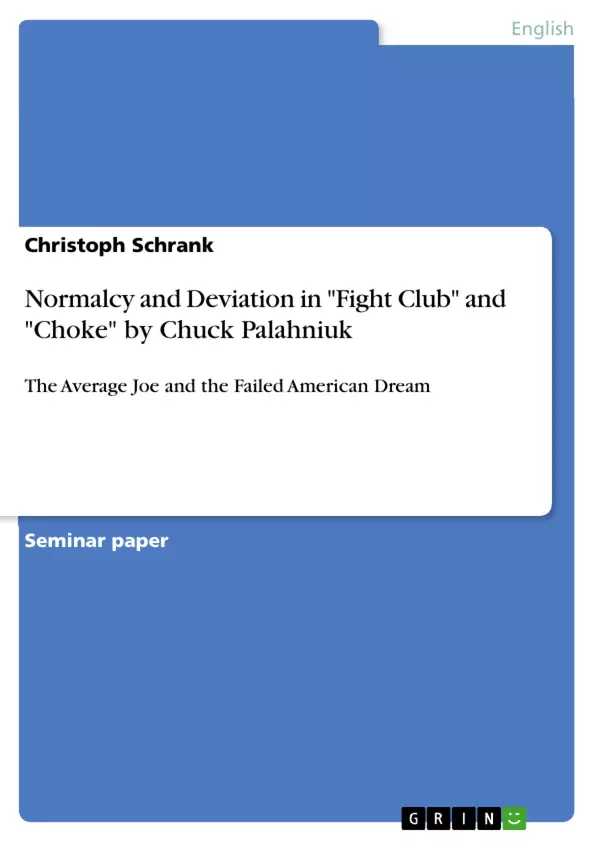The paper identifies important themes, tropes, and types in select extracts from the novels "Fight Club" and "Choke" by Chuck Palahniuk, as well as stylistic and narratological devices with which Palahniuk addresses (and debunks) the idea of normalcy.
The authors reading of Palahniuk's novels "Fight Club" (1996) and "Choke" (2001) posits these two as exemplary texts due to the way in which his assessment of the failed American Dream manifests itself. Both novels are organized around individuals who become part of, or form, communities—e pluribus unum. The titular Fight Club / Project Mayhem and the sex addiction therapy group in Choke respectively become arenas in which seemingly average people act out their social incompatibilities such as their violent desires or the need to talk about their sexual (or otherwise) perversions.
Chuck Palahniuk's name has become synonymous with depictions of a dark world populated by morally degenerate characters who are canonically read as both a harsh critique of the United States in times of late / post-capitalism and a negotiation of the status quo of the American working and middle class.
Inhaltsverzeichnis (Table of Contents)
- Introduction
- Getting Physical: Palahniuk and the Body
- An Object-Oriented Ontology? Capitalism and Commodities
- "We Just Want to Belong". Community and Institutions
- Conclusion
Zielsetzung und Themenschwerpunkte (Objectives and Key Themes)
This analysis examines the novels Fight Club and Choke by Chuck Palahniuk, focusing on how they critique the American Dream and the role of physicality and community in shaping individual identity. The analysis explores the complex relationship between normalcy and deviation in Palahniuk's works, examining how his characters navigate the pressures of consumerism and a culture that seeks to suppress their desires.
- The portrayal of 'average Joes' and their transformation under extraordinary circumstances
- The critique of American consumerism and capitalism
- The exploration of masculinity and its connection to violence and self-destruction
- The role of community and institutions in shaping individual identity
- The relationship between the body and the mind in Palahniuk's work
Zusammenfassung der Kapitel (Chapter Summaries)
The introduction sets the stage by examining Chuck Palahniuk's literary style and the way he portrays "average Joes" who are transformed by their internal and external struggles. The analysis focuses on the novels Fight Club and Choke, highlighting how they exemplify Palahniuk's critique of the American Dream.
Chapter 2 delves into Palahniuk's focus on the human body, exploring how he utilizes the physical experience to illuminate the complex interplay between the mind and body. The chapter analyzes specific examples from Fight Club, examining how the novel critiques a certain type of misdirected masculinity and the obsession with physical strength.
Schlüsselwörter (Keywords)
This analysis explores the key themes of normalcy, deviation, consumerism, capitalism, masculinity, community, and the body in Chuck Palahniuk's novels Fight Club and Choke. The focus lies on understanding how these themes are intertwined in Palahniuk's unique literary style and his critique of American culture.
Frequently Asked Questions
What are the main themes in Chuck Palahniuk's "Fight Club" and "Choke"?
The novels explore themes of normalcy, deviation, consumerism, masculinity, and the critique of the American Dream in post-capitalist society.
How does Palahniuk define 'normalcy' in his works?
Palahniuk often portrays normalcy as a stifling, consumer-driven facade that suppresses individual desires, which his characters eventually debunk or escape through deviant behavior.
What is the significance of the 'body' in these novels?
The body is used as a medium for physical experience and self-assertion, often through violence or sexual addiction, to reconnect with reality in a commodified world.
What role does community play in Palahniuk's stories?
Communities like Project Mayhem or therapy groups provide a space for social outcasts to act out their incompatibilities and find a sense of belonging outside mainstream society.
How is masculinity critiqued in "Fight Club"?
The novel critiques a misdirected form of masculinity that seeks validation through violence and physical destruction as a reaction to the emasculating effects of consumer culture.
What does the term 'Object-Oriented Ontology' refer to in this context?
It refers to the analysis of how capitalism and commodities (objects) define and control the identity and existence of the characters.
- Citar trabajo
- Christoph Schrank (Autor), 2020, Normalcy and Deviation in "Fight Club" and "Choke" by Chuck Palahniuk, Múnich, GRIN Verlag, https://www.grin.com/document/594676



